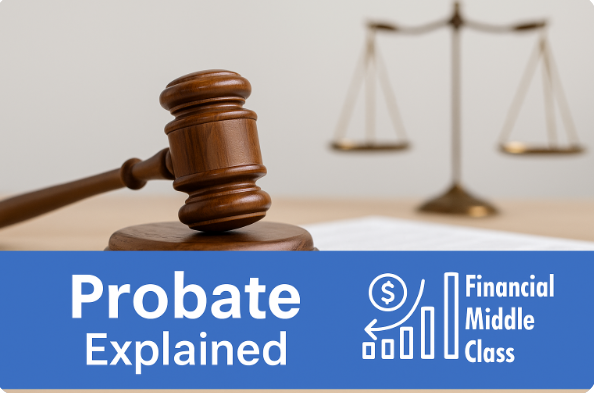Introduction: Why Probate Matters
If you’ve ever lost a loved one, you know grief has a way of taking over everything. The last thing you want to think about is paperwork and court filings. Yet, that’s exactly where many families find themselves—facing the probate process. Probate is the legal system’s way of making sure debts are paid and assets are distributed. It sounds intimidating, but once you understand the basics, you’ll see it’s more about patience and process than mystery.
This guide walks you through probate in plain English. We’ll cover what it is, how long it takes, what it costs, and how to make the process easier for your family. Along the way, we’ll look at how probate works in Florida, California, and New York—three states with very different rules.
What Is Probate?
Probate is the court-supervised process of transferring a deceased person’s assets to their heirs or beneficiaries. Think of it as the legal checklist the state requires before property officially changes hands.
- If there’s a will: The court validates it and ensures the executor follows its instructions.
- If there’s no will (intestacy): The court uses state law to decide who inherits what.
Common assets that may go through probate:
- Real estate
- Bank accounts not jointly owned
- Personal property like cars or jewelry
Not everything requires probate. For example, life insurance with a named beneficiary usually bypasses the process.
How Long Does Probate Take?
The timeline depends on the complexity of the estate and the state’s rules. On average:
- Simple estates: 6 to 9 months
- More complex estates (real estate, disputes, or business assets): 12 to 18 months
- Contested estates: Years
State Examples
- Florida: Probate usually takes 6–12 months for uncontested estates. Florida requires formal probate for estates valued over $75,000, which can extend the timeline.
- California: Known for having one of the longest probate processes, often 12–18 months or more. Delays happen because of court backlogs and strict notice requirements.
- New York: Probate in NYC can take 9 months to 2 years, depending on whether the Surrogate’s Court is backed up. Rural counties may move faster, but disputes can drag cases out for years.
What Does Probate Cost?
Probate isn’t free, and families should prepare for several categories of expenses:
- Court fees – Filing fees vary but often range from $200 to $1,000.
- Attorney fees – Some states allow hourly billing, others a percentage of the estate.
- Executor fees – Executors may be entitled to compensation, though family members often waive it.
- Other costs – Appraisals, accounting, and document preparation.
It’s not unusual for probate costs to eat up 3–7% of the estate’s value.
State Examples
- Florida: Filing fees run around $300–$400. Attorneys typically charge flat fees or hourly rates, but Florida law also allows a percentage-based fee (about 3% for estates under $1 million).
- California: Probate costs are high because attorney and executor fees are set by statute and based on estate value. For example, a $500,000 estate can result in over $26,000 in combined fees.
- New York: Filing fees range from $45 to $1,250 depending on the estate size. Attorneys often bill hourly, but costs still average 2–5% of the estate.
Why Do Families Dread Probate?
The main complaints are:
- It’s slow. Months or even years before heirs receive their inheritance.
- It’s public. Court filings are often public records.
- It’s expensive. Legal fees and administrative costs reduce the inheritance.
That said, probate also has a purpose: it ensures fairness and prevents fraud. The system makes sure debts get paid and that the right people inherit.
Can Probate Be Avoided?
Not always, but planning ahead can help reduce the impact. Here are common strategies:
- Joint ownership: Property owned jointly with rights of survivorship passes directly to the co-owner.
- Beneficiary designations: Life insurance, retirement accounts, and payable-on-death bank accounts avoid probate.
- Revocable living trust: Assets in a trust are managed privately and outside probate.
Even small steps like adding beneficiaries to accounts can save your family months of waiting.
Action Steps for Families
If you’re facing probate right now:
- Get the death certificate. You’ll need multiple copies.
- Locate the will. If one exists, file it with the probate court.
- Inventory assets. Make a list of property, bank accounts, and debts.
- Consult a probate attorney. Especially if real estate or disputes are involved.
- Communicate with heirs. Transparency reduces conflict.
If you’re planning ahead:
- Review your accounts and make sure beneficiaries are up to date.
- Consider creating a living trust.
- Talk openly with your family so there are fewer surprises later.
The Bottom Line
Probate isn’t something anyone looks forward to, but it’s not an endless nightmare either. With the right preparation, families can minimize stress, reduce costs, and keep the focus where it belongs—on honoring their loved one’s memory.
📌 Related Reads from Financial Middle Class:
What Happens to Credit Card Debt When Someone Dies
Estate Planning Basics: Protecting Your Family From Debt and Delays
Executor Duties Checklist: What to Do After a Loved One Dies
